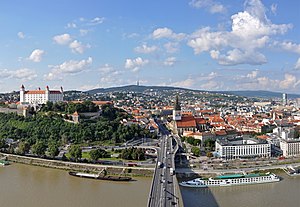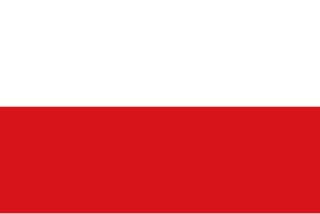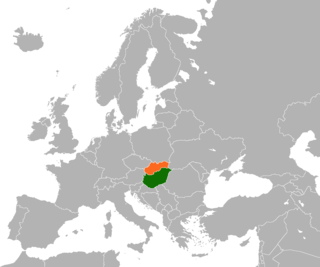| Rugby union in Slovakia | |
|---|---|
 | |
| Country | Slovakia |
| National team(s) | Slovakia |
National competitions | |
Audience records | |
| Single match | ? (?). ? vs ? (?, ?) |
Rugby union in Slovakia is a minor but growing sport.
| Rugby union in Slovakia | |
|---|---|
 | |
| Country | Slovakia |
| National team(s) | Slovakia |
National competitions | |
Audience records | |
| Single match | ? (?). ? vs ? (?, ?) |
Rugby union in Slovakia is a minor but growing sport.
The governing body is the Slovak Rugby Union.

Rugby union was introduced to Czechoslovakia (as it was then) by the Czech/Moravian writer Ondřej Sekora, when he returned from living in France in 1926, with a rugby ball and set of rules. [1] [2] [3] It developed during the interbellum, but was severely disrupted by the tribulations of World War II, and the Cold War.
Although Slovakia was under the aegis of Czechoslovak rugby bodies, the centre of gravity was firmly in Bohemia and to a lesser extent Moravia, with Slovakia finishing a distant third in terms of participation. However, rugby union was being played in Bratislava by ŠK Slávia Bratislava as early as 1927. [4]
Czechoslovakia was a founder member of FIRA in 1934, and joined the IRB in 1988. [1] The Czechoslovak Rugby Union was founded in 1926; after the Velvet Divorce, Slovakia founded its own in the 1990s.
Like many minor European rugby nations, Slovak rugby has tended to centre on the capital: Bratislava, with fleeting starts in provincial towns and the countryside. It has a minor presence in one or two schools. [5]
Rugby union is completely amateur in Slovakia, leading by RC Slovan Bratislava, club settled in the capital of Slovakia.

Czechoslovakia was a landlocked state in Central Europe, created in 1918, when it declared its independence from Austria-Hungary. In 1938, after the Munich Agreement, the Sudetenland became part of Nazi Germany, while the country lost further territories to Hungary and Poland. Between 1939 and 1945, the state ceased to exist, as Slovakia proclaimed its independence and Carpathian Ruthenia became part of Hungary, while the German Protectorate of Bohemia and Moravia was proclaimed in the remainder of the Czech Lands. In 1939, after the outbreak of World War II, former Czechoslovak President Edvard Beneš formed a government-in-exile and sought recognition from the Allies.

The dissolution of Czechoslovakia, which took effect on December 31, 1992, was the self-determined secession of the federal republic of Czechoslovakia into the independent countries of Czechia and Slovakia. Both mirrored the Czech Socialist Republic and the Slovak Socialist Republic, which had been created in 1969 as the constituent states of the Czechoslovak Socialist Republic until the end of 1989.

ŠK Slovan Bratislava is a professional football club based in Bratislava, Slovakia, that plays in the Slovak Super Liga. Founded as I. ČSŠK Bratislava in 1919, the club changed its name to Slovan Bratislava in 1953. Slovan is the most successful team in Slovakia with the most titles in both league and cup in the country.
Jozef Vengloš was a Slovak professional football player and manager. He held a doctorate in Physical Education and also specialised in Psychology. He was selected by FIFA on various occasions to lecture at the FIFA academies throughout the world.

Jozef Adamec was a Slovak football forward and manager.
Dušan Galis is a Slovak politician and a former football player and manager. In the Czechoslovak league he played 226 matches, scoring 89 goals. He was capped eight times for Czechoslovakia national team, scoring one goal. He was a participant at the 1976 European Football Championship where he became European Champion with his national team.

Ján Popluhár was a Slovak footballer who primarily played as a sweeper for Slovak club ŠK Slovan Bratislava. At international level, he was also a member of the Czechoslovakia national team, playing in two World Cups.

Karol Jokl was a Slovak football player and manager. He played for ŠK Slovan Bratislava and Czechoslovakia.
Theodor Reimann, also known as Teodor Reimann, was a football goalkeeper and manager. At club level he played mostly for Slovan Bratislava. Internationally he played for both Slovakia and Czechoslovakia. He obtained 14 caps for Slovakia from 1939 to 1943. He obtained five caps between 1948 and 1954 for Czechoslovakia including one at the 1954 FIFA World Cup.

Hockey Club Slovan Bratislava is a professional ice hockey club based in Bratislava, Slovakia. In 2012, it left the Slovak Extraliga and joined the international Kontinental Hockey League (KHL). In 2019, it returned to the Tipos Extraliga. The club has won nine Slovak championships, one Czechoslovak championship (1979) and one IIHF Continental Cup (2004), making it the second most successful hockey club in Slovak history after their biggest rival HC Košice. The team plays its home games at Ondrej Nepela Arena, also known as Slovnaft Arena. The team is nicknamed Belasí, which means the "sky blues" in English.

The First Czechoslovak Republic, often colloquially referred to as the First Republic, was the first Czechoslovak state that existed from 1918 to 1938, a union of ethnic Czechs and Slovaks. The country was commonly called Czechoslovakia, a compound of Czech and Slovak; which gradually became the most widely used name for its successor states. It was composed of former territories of Austria-Hungary, inheriting different systems of administration from the formerly Austrian and Hungarian territories.
Various sports and sports teams have a long tradition in Bratislava, with many sport teams and individuals competing in the best Slovak and international leagues and competitions. Many significant sports events, such as World and European Championships, have been held in Bratislava. The 2011 Men's Ice Hockey World Championships were held in Bratislava, along with Košice. A new arena was built to host this event.
The Czechoslovakia national rugby union team was the national rugby team of Czechoslovakia, before the country was split into the Czech Republic and Slovakia. They participated in qualifiers for the 1991 Rugby World Cup, but did not qualify.

Bratislava, is the capital and largest city of Slovakia and the fourth largest of all cities on Danube river. Officially, the population of the city is about 475,000; however, some sources estimate it to be more than 660,000—approximately 140% of the official figures. Bratislava is in southwestern Slovakia at the foot of the Little Carpathians, occupying both banks of the River Danube and the left bank of the River Morava. Bordering Austria and Hungary, it is the only national capital to border two sovereign states.

Bozhin Georgiev Laskov (Bulgarian: Божин Георгиев Ласков; was a naturalised Slovak association football player of Bulgarian descent and origin, who played as a striker, noted for his tall stature, impressive physique and great heading. In addition, post-retirement Laskov served as a otorhinolaryngologist and a trained Bulgarian Orthodox priest. After 1946, he lived and worked in Czechoslovakia and is counted among Bulgaria's and Slovakia's best footballers of the era.

Hungary and Slovakia are two neighboring countries in Central Europe. There are two major periods of official foreign relations between them in contemporary history. The first period included relations between the Kingdom of Hungary and the first Slovak Republic in 1939–1945. The second period started in 1993, when the countries again established diplomatic relations, the year when Slovakia became independent of Czechoslovakia. Hungary has an embassy in Bratislava and a general consulate in Košice, and in Nitra, and Slovakia has an embassy in Budapest and a general consulate in Békéscsaba.

Rugby union in the Czech Republic is a growing sport. As of 1 November 2010, they are currently ranked thirty-first in the International Rugby Board's world rankings,.

Rugby union in Czechoslovakia was a moderately popular sport. It was most popular in Moravia, Prague and Bratislava
The I. liga žien is the top level women's football league of Slovakia.
The Czechoslovak Figure Skating Championships were a national championship held annually in Czechoslovakia until its dissolution in 1993 into the Czech Republic and the Slovak Republic. Medals were awarded in the disciplines of men's singles, ladies' singles, pair skating, and ice dancing.